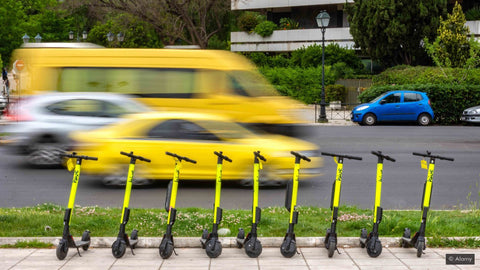The rise of the E-Scooter-Is this the future of Transport?
You might have started seeing more of them on streets and in parks, gliding past you with a faint electric hum. As lockdowns lift and people avoid public transport, e-scooters – stand-up, electrically powered scooters – are becoming more popular.
The easing of lockdowns has highlighted the importance of individual, emission-free, socially distanced transport as governments try to prevent a spike and pollution. But the story of e-scooters is one of both a popular tech gadget and a contentious form of transport. While they offer a seemingly fun and environmentally friendly option for short journeys, a range of questions about their safety and sustainability have emerged in the past two years.
So how did e-scooters go from risky tech novelty to a green travel solution for the coronavirus recovery?
E-scooters have been available to privately buy for over a decade but many remain prohibitively expensive. It took the affordable, accessible option of shared, dockless models – which can be rented by the minute using a smartphone app – for their popularity to skyrocket. In 2018, shared e-scooter startups Bird and Lime rapidly introduced them to US cities. Soon after, the companies – along with a proliferation of other startups, including European-based Voi and Tier – began to rapidly expand across cities internationally.
The start-up Voi claims its service is now fully carbon-neutral, achieved through measures including swappable batteries, longer-lasting scooter design and electrification of service fleets. Voi first implemented these measures in Paris, where they were found to reduce emissions by 71%, according to a report from EY. Tier is working to move all its warehouses to run on green electricity by the end of 2020, as well as replace all diesel vans and have all e-scooters using swappable batteries by 2021. Tier’s operations in Austria, Switzerland, Sweden, and France already run entirely on e-vehicles.

“New normal”
Such apparent commitment to sustainability no doubt appeals to governments in the coronavirus recovery as they seek to support transport needs that adhere to social distancing while avoiding increases in polluting car use.
Although many shared e-scooters were taken out of service during lockdowns, they are slowly returning to cities, with ramped-up cleaning measures. Meanwhile, retailers have reported sales of private e-scooters increasing in places including Finland, Ireland and the UK, despite their use on public streets still being illegal in the latter two countries. Things are set to change quite extensively in the UK, though. Shared e-scooter trials were planned for 2021 in four select areas, but in response to the newly restricted capacity of public transport, were brought forward to this summer and offered nationally.
But the UK is not alone in embracing e-scooters as part of post-Covid transport strategies. In Australia, Brisbane recently decided to extend its e-scooter trial by a year, expanding provision into the suburbs as part of efforts to increase active transport in the coronavirus recovery. In Colombia, Bogotá changed its’ e-scooter regulations to allow more providers to offer their services post-lockdown, with no payment to the city. In Argentina, Buenos Aires is actively encouraging short trips to be taken by bicycles and scooters, which it says “play a fundamental role in the mobility of residents in this new scenario”.
Rome welcomed its first shared e-scooters in May. “Rome is starting again under the banner of sustainable mobility,” said mayor Virginia Raggi of the new scheme. “During these unprecedented times, our habits have changed, and as an administration, we are promoting new mobility choices.”
The Italian government’s Covid-19 Task Force has partnered with e-scooter company Helbiz to help support socially distanced mobility across the country. “It is necessary to change the paradigm and make a Copernican revolution in the mobility industry,” says Filomena Maggino, head of the task force’s mobility delegation. “We are prioritising the wellbeing of our citizens and choosing the options that allow everyone to move without compromising sustainability. Micro-mobility solutions embody the needs for fair and sustainable mobility.” The government is also offering resident subsides for buying an e-scooter.Now, e-scooter sharing schemes are available in more than 100 cities, across at least 20 countries, from Chile to South Korea to New Zealand – although Europe and the US continue to dominate in terms of use. Research suggests that by 2024, 4.6 million shared e-scooters will be in operation worldwide, up from 774,000 in 2019.
Now, e-scooter sharing schemes are available in more than 100 cities, across at least 20 countries, from Chile to South Korea to New Zealand – although Europe and the US continue to dominate in terms of use. Research suggests that by 2024, 4.6 million shared e-scooters will be in operation worldwide, up from 774,000 in 2019.




